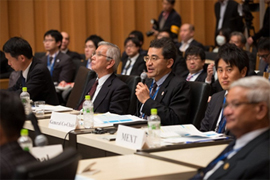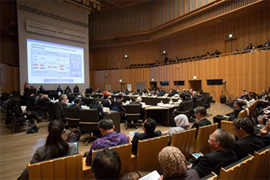APRSAF-21

The 21st Session of the Asia-Pacific Regional Space Agency Forum (APRSAF-21), Tokyo, Japan, December 2-5, 2014
Overview
The twenty-first session of the Asia-Pacific Regional Space Agency Forum (APRSAF-21) successfully concluded its 4-day program on Friday, December 5, 2014, in Tokyo, Japan. The session was attended by 580 participants from 33 countries and regions, as well as 12 international organizations.
APRSAF-21, as was the case in the past, consisted of four working group sessions that were held in parallel and the Plenary session. The framework of four working groups had been restructured following Recommendation #41 of APRSAF-20 and commenced at this 21st session for the first time. There were also relevant events in conjunction with APRSAF-21. The New Cooperation Sessions were also held on Day1 and Day2 with ten proposers made their presentations.
At the Plenary session on Day 3, December 4, Opening Remarks by Mr. Satoshi Tanaka, Director-General of the Research and Development Bureau, Ministry of Education, Culture, Sports, Science and Technology (MEXT) , Welcome Remarks by Mr. Takashi Uto, Parliamentary Vice-Minister for Foreign Affairs, Mr. Sadayuki Tsuchiya, Deputy Minister of Education, Culture, Sports, Science and Technology, and Mr. Masato Nakamura, Deputy Director General, Office of National Space Policy, Cabinet Office, and Keynote Speech by Dr. Yasushi Horikawa, Previous Chairperson of UNCOPUOS and Technical Counselor of JAXA were delivered.
Following the remarks and speech, there were also Summary of APRSAF-20 by Prof. Doan Minh Chung, Director, Space Technology Institute (STI), Vietnam Academy of Science and Technology (VAST), Vietnam, Report by APRSAF ExCom, and activity reports from countries in the Asia-Pacific region including new-added country reports from Mongolia, Pakistan, The Philippines, and the United Arab Emirates, progress reports from four APRSAF initiatives, as well as APRSAF Related Projects, such as the 6th Asia Oceania Regional Workshop on GNSS delivered.
Three Special Sessions were also held on Day3. In the first special session entitled “Societal Needs and Space for Practical Applications”, moderated by a research institute, CSIRO (Australia), panelists from space agencies, JAXA (Japan) and LAPAN (Indonesia); local authorities, Bangladesh Water Development Board (BWDB) and Philippine Institute of Volcanology and Seismology (PHIBOLCS); and development aid agencies, Japan International Cooperation Agency (JICA) emphasized that further cooperation of the three sectors would lead to solving regional issues toward better society by using space technologies.
The second special session was moderated by Mr. Soichi Noguchi, JAXA Astronaut and President of Association of Space Explorers, two panelists from ANGASA (Malaysia) and NSTDA (Thailand) presented their comments on ISS benefits in their country and their expectation to future global space exploration, with the session theme of “ISS and Beyond – Toward Global Space Exploration.”
In the last special session, Asia-Pacific Space Leaders Meeting (AP-SLM), leaders from 13 countries, Australia (Department of Industry: DOI), India (Indian Space Research Organisation: ISRO), Indonesia (National Institute of Aeronautics and Space: LAPAN), Japan (JAXA), Kazakhstan (Aerospace Committee: KAZCOSMOS), Malaysia (National Space Agency: ANGKASA), Mongolia (Information Communications Technology and Post Authority: ICTPA), Pakistan (National Space Agency: SUPARCO), the Philippines (Department of Science and Technology: DOST), Republic of Korea (Korea Aerospace Research Institute: KARI), Singapore (Centre for Remote Imaging, Sensing and Processing: CRISP), the United Arab Emirates (Emirates Institution for Advanced Science and Technology: EIAST), Vietnam (VAST), released the Joint Statement “Toward the Advancement of Activities in Exploration and Utilization of Outer Space for a Better Future of People on Earth.”
On Day 3, special presentations were also delivered; “Summary of the International Space Exploration Forum (ISEF)” was made by Mr. David Turner, Deputy Director, Office of Space and Advanced Technology, Department of State, the USA and “Japan’s Space Exploration Strategy: An Interim Report from MEXT’s ISS-Space Exploration Committee” by Dr. Atsushi Sunami, Professor, National Graduate Institute for Policy Studies (GRIPS), Japan.
At the beginning of Day 4, December 5, three international organizations delivered their presentation: Dr. Shamika Sirimanne, Director, Information and Communications Technology and Disaster Risk Reduction Division, United Nations Economic and Social Commission for Asia and the Pacific (UNESCAP), Mr. Osamu Ochiai, Scientific and Technical Officer, Group on Earth Observations (GEO) Secretariat, and Mr. Kiyoshi Higuchi, President, International Astronautical Federation (IAF).
Following the talks from international organizations, three presentations forcing on space cooperation in the Asia Pacific Region were presented: “The Current U.S. Civil Space Activities in A/P Region on GNSS” by Mr. David Turner, Deputy Director, Office of Space and Advanced Technology, Department of State, the USA, “UK – A New Approach to and International Partnership in Space” by Mr. Chris Lee, Head of International Space Policy, Space Policy Department, UK Space Agency, the UK, and “Japan’s Space Diplomacy and Space Cooperation in the Asia-Pacific Region” by Mr. Takao Imafuku, Director, Space Policy Division, Foreign Policy Bureau, Ministry of Foreign Affairs, Japan.
As the last presentations at APRSAF-21, four working groups, Space Applications Working Group (SAWG), Space Technology Working Group (STWG), Space Environment Utilization Working Group (SEUWG), and Space Education Working Group (SEWG), reported the results from Day 1 and 2 and presented their recommendations to the Plenary.
At the end of the Plenary session, the participants of APRSAF-21 adopted the Recommendations. The Philippines proposed hosting APRSAF-23 in 2016, and it was approved.
Following the adoption of Recommendations, LAPAN made a brief presentation about the next session o APRSAF, APRSAF-22, to be held in Bali, Indonesia.
-

General Co-chairs: Dr. Isogai, Deputy Director General, Research and Development Bureau, MEXT (Right) and Dr. Horikawa, Previous Chairperson of UNCOPUOS, Technical Counselor, JAXA
-

Plenary session









